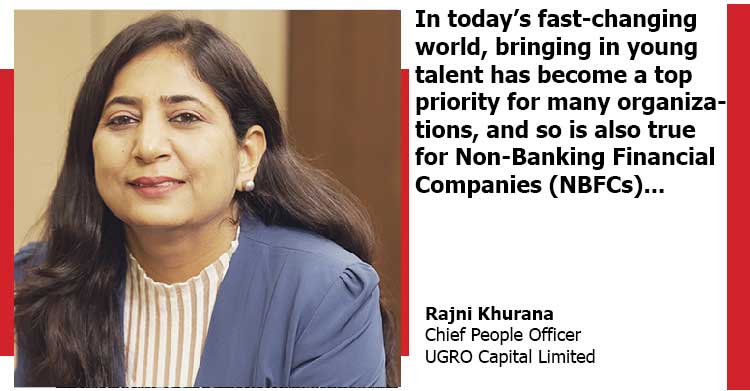How NBFCs Can Effectively Attract Gen Z and Millennial Talent | Rajni Khurana | Chief People Officer | UGRO Capital Limited

In today’s fast-changing world, bringing in young talent has become a top priority for many organizations, and so is also true for Non-Banking Financial Companies (NBFCs). Gen Z and Millennials view work quite differently from previous generations, and it’s this shift in mindset that we need to understand how we want to create a thriving, inclusive workplace.
For younger professionals, a job isn’t just about earning a pay check. Unlike previous generations who might have felt a stronger financial obligation, the younger workforce is motivated by more than just money. What really drives them is their sense of purpose. According to Deloitte’s 2023 Gen Z and Millennial Survey, 46% of Gen Z prioritize jobs that align with their personal values and purpose. They need to feel that their work matters, that their contributions align with the organization’s mission, and that what they do has a very real and tangible impact. When they are able to see that connection, they are far more likely to stay engaged and committed.
Another key difference is how strongly they align their values with the company’s culture. Gen Z and Millennials aren’t just looking for a job—they want to work for organizations that reflect their beliefs, whether it’s about social responsibility, innovation, or inclusivity. A 2023 Glassdoor survey revealed that 76% of employees and job seekers consider diversity and inclusivity when evaluating companies and job offers. If the company’s values resonate with them, they’re much more likely to be loyal and motivated.
Work-life balance looks very different for today’s younger workforce. For previous generations, it was often about juggling work with family responsibilities or health. But for Gen Z and Millennials, personal time is just as important, simply for the sake of having it. In a LinkedIn report on workplace trends, 72% of Gen Z respondents stated that maintaining a work-life balance is a top career priority. They want the freedom to manage their schedules and work in a way that fits their lifestyle, emphasizing the need for flexible working hours and remote work options.
On top of this, they expect continuous learning and growth opportunities. This generation thrives in environments that challenge them and invest in their development. They want to know that the organization is committed to upskilling them and offering chances for personal and professional growth. According to a 2023 LinkedIn Workplace Learning Report, 76% of Gen Z employees state that learning is the key to a successful career, and 68% are more likely to stay with a company that offers significant learning opportunities. Whether it is through mentorship, training programs, or career advancement opportunities, organisations that fulfil their need to be on a path of constant growth improvement will naturally be welcomed by the Gen Z workforce.
Gen Z and Millennials value autonomy and creativity in their roles. They prefer to be given clear goals and the space to achieve them in their own way. Micromanagement not only stifles their creativity but also dampens their commitment. Trusting them to take ownership of their tasks and encouraging independent thinking is key to keeping them engaged.
Finally, it is important to remember that this new generation is incredibly tech-savvy. They’re digital natives, and they expect workplaces to be equipped with the tools and technology that allow them to be efficient and innovative. Offering a tech-forward environment where they can apply their digital skills and do more intellectual rather than monotonous work makes them feel valued and helps them perform at their best.
The workplace is evolving with newer, vibrant elements, shaped by this generation’s distinct preferences:
Mental and Physical Well-being: A study by McKinsey & Co. indicates that 80% of Gen Z prioritize mental health in workplace benefits. Similarly, there is a growing trend toward fitness reimbursement and flexible health coverage.
Inclusivity and Diversity: A younger workforce demands inclusivity not just in policies but also in mindset. 75% of Gen Z employees believe that inclusivity is a non-negotiable aspect of workplace culture.
Increasing Women / diversity in the Workforce: As of 2023, women’s participation in the workforce is at its highest, and companies that promote gender equality have an easier time attracting Gen Z and Millennial talent.
Cultural Vibrancy: Younger generations welcome celebrations of diversity and festivals in the workplace, reflecting their broader acceptance of different cultures and traditions.
Social & Emotional Prudence: This generation has heightened social awareness. A survey by PwC found that 54% of Gen Z and Millennials prefer employers with strong corporate social responsibility (CSR) initiatives.
Ultimately, attracting and retaining young talent isn’t about offering flashy perks or competitive salaries alone—it’s about creating a work environment that aligns with their values, offers them growth, and gives them the shades of flexibility they crave. By embracing these changes and adapting to their expectations, NBFCs will not only attract the best and brightest but also build a workforce that is ready for the future.


